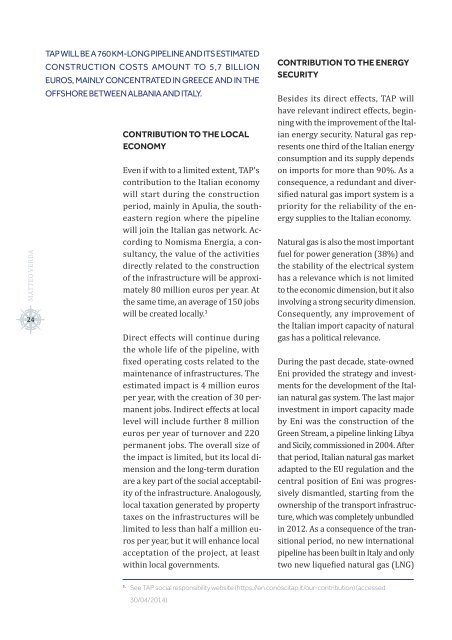Caspian Report - Issue: 07 - Spring 2014
Create successful ePaper yourself
Turn your PDF publications into a flip-book with our unique Google optimized e-Paper software.
Matteo Verda<br />
24<br />
TAP will be a 760 km-long pipeline and its estimated<br />
construction costs amount to 5,7 billion<br />
euros, mainly concentrated in Greece and in the<br />
offshore between Albania and Italy.<br />
Contribution to the local<br />
economy<br />
Even if with to a limited extent, TAP’s<br />
contribution to the Italian economy<br />
will start during the construction<br />
period, mainly in Apulia, the southeastern<br />
region where the pipeline<br />
will join the Italian gas network. According<br />
to Nomisma Energia, a consultancy,<br />
the value of the activities<br />
directly related to the construction<br />
of the infrastructure will be approximately<br />
80 million euros per year. At<br />
the same time, an average of 150 jobs<br />
will be created locally. 3<br />
Direct effects will continue during<br />
the whole life of the pipeline, with<br />
fixed operating costs related to the<br />
maintenance of infrastructures. The<br />
estimated impact is 4 million euros<br />
per year, with the creation of 30 permanent<br />
jobs. Indirect effects at local<br />
level will include further 8 million<br />
euros per year of turnover and 220<br />
permanent jobs. The overall size of<br />
the impact is limited, but its local dimension<br />
and the long-term duration<br />
are a key part of the social acceptability<br />
of the infrastructure. Analogously,<br />
local taxation generated by property<br />
taxes on the infrastructures will be<br />
limited to less than half a million euros<br />
per year, but it will enhance local<br />
acceptation of the project, at least<br />
within local governments.<br />
Contribution to the energy<br />
security<br />
Besides its direct effects, TAP will<br />
have relevant indirect effects, beginning<br />
with the improvement of the Italian<br />
energy security. Natural gas represents<br />
one third of the Italian energy<br />
consumption and its supply depends<br />
on imports for more than 90%. As a<br />
consequence, a redundant and diversified<br />
natural gas import system is a<br />
priority for the reliability of the energy<br />
supplies to the Italian economy.<br />
Natural gas is also the most important<br />
fuel for power generation (38%) and<br />
the stability of the electrical system<br />
has a relevance which is not limited<br />
to the economic dimension, but it also<br />
involving a strong security dimension.<br />
Consequently, any improvement of<br />
the Italian import capacity of natural<br />
gas has a political relevance.<br />
During the past decade, state-owned<br />
Eni provided the strategy and investments<br />
for the development of the Italian<br />
natural gas system. The last major<br />
investment in import capacity made<br />
by Eni was the construction of the<br />
Green Stream, a pipeline linking Libya<br />
and Sicily, commissioned in 2004. After<br />
that period, Italian natural gas market<br />
adapted to the EU regulation and the<br />
central position of Eni was progressively<br />
dismantled, starting from the<br />
ownership of the transport infrastructure,<br />
which was completely unbundled<br />
in 2012. As a consequence of the transitional<br />
period, no new international<br />
pipeline has been built in Italy and only<br />
two new liquefied natural gas (LNG)<br />
3.<br />
See TAP social responsibility website (https://en.conoscitap.it/our-contribution) (accessed<br />
30/04/<strong>2014</strong>).










